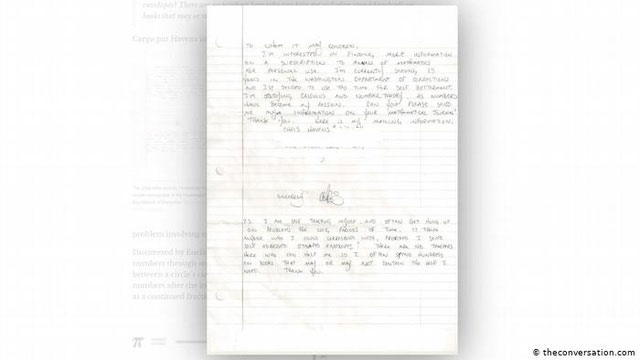Prisoners commit murder to solve the ancient problem, find the meaning of life
A prisoner who committed murder offenses in the United States taught himself basic advanced mathematics, so he solved a complex arithmetic problem. Not only that, he also passed on his passion for mathematics to his inmates.
If this was a Hollywood movie, you might think it was just a fictional, stupid story, exaggerated. But through this case, we can see that reality is much more unexpected than fiction.
Christopher Havens , an American, has lived very hard for a long time. Christopher is 40 years old, a prisoner who was imprisoned for 9 years after committing murder. Before that, the young Christopher dropped out of school, lost his life, became unemployed and then became a drug addict. He was sentenced to 25 years in prison for murder and still has a 16-year sentence.
While in prison, Christopher's life changed when he found a passion for mathematics. He taught himself the basics of advanced math, although it was not easy because the ward official often blocked the books he ordered and he could only accept books provided he had to teach mathematics to other prisoners.

'Numbers have become my task,' Christopher wrote in a letter to the math publisher.
After some time, feeling that basic knowledge of advanced mathematics was not enough to satisfy his passion, Christopher sent a handwritten letter to a math publisher and asked about some contents in the specialized journal. mathematics Annals of mathematics.
Math is a task
In the letter, Christopher wrote that the numbers had become his 'task' and he decided to use his time in prison to improve himself. However, he was sad because there was no one to discuss the complex mathematical contents with.
An editor of the Mathematical Sciences Publishing House sent this letter to her partner, Marta Cerruti, who then passed the letter to her father, Umberto Cerruti, a mathematics professor in Turin, Italy. Initially, Professor Cerruti was skeptical, but respecting his daughter, he wrote to Christopher and wrote a problem to test his ability.
After a while, Professor Cerruti received a solution from Christopher, a paper-based one, 1.2 meters long with an unexpectedly long formula. The professor first entered that formula into a computer to check what the prisoner had sent him, and then he realized he had solved the problem completely correctly.
Later, Professor Cerruti invited Christopher to help him solve an ancient problem that he had been trying to do for a long time.
Ancient mysteries have been solved
With only pen and paper, Christopher did not take much time to solve the problem of number theory called fractional division that the ancient Greek mathematician Euclid had a lot of thought.
Simply put, a fractional number is a mixed fraction, where the denominator is another composite fraction, thus extending into multiple layers to infinity. However, fractions are not used in simple arithmetic but to solve asymptotic problems so that people get the results of complex calculations.
For example, number theory is used in cryptography, an area of great importance today in banking and finance as well as in military information exchange.
And it's true that Christopher solved a long-standing problem and first found some asymptotic laws of a large number set. Professor Cerruti helped Christopher set up the proof of the problem scientifically and accurately. A few months later, that is, in January 2020, they announced how to solve this problem in the journal Theory of Numbers.
This is really a success. Prisoner Christopher not only solved an ancient problem, he also inspired a group of fellow prisoners of the world of numbers. From then on, in his prison formed a regular math club.

Typical fractions can be used to calculate approximate results of complex calculations.
The passion is aroused
Among the activities of the prison math club, Christopher and 14 of his fellow inmates also celebrate March 14 every year as the 'Pi day ' , which is named after the valuable Pi mathematical constant. approximately 3.14. Professor Cerruti may also participate in one of these commemorative events under strict security supervision. The professor was also impressed with a prisoner who could recite the first 461 decimal digits of Pi, telling this story in an article called 'Pi Day Behind Behind Bars - Doing Maths in Prison.' published in Mathematical Horizons.
For the remaining 16 years in prison, Christopher wanted to continue to learn about other contents of mathematics. He felt that studying mathematics was a way to 'repay the debt for life' . His hope is that after leaving prison, he will officially study this field. And maybe his strange life will someday step on the Hollywood screen.
- New findings: Reduce crime rates by consulting prisoners to make reasonable decisions
- Archaeological site of torture of prisoners
- Drugs 'distorting' time for prisoners to serve 1,000 years
- Are you among the 20%
- Only people with IQ above 140 or ... Conan can solve this case, what about you?
- Decoding the case of shocking network after 4,000 years
- Deciphering the mystery 'Haunted song' causes many people to commit suicide
- Find the solution to one of the most difficult math problems
- Prisoners who have never escaped, prisoners who are released also do not want to go to prison
- Life before protein
- Science proves everyone can find the truth of life at age 60
- The prize was awarded to the postman on the board, winning 1 million dollars in bonuses
 Betray
Betray The most amazing balancing rocks in the world
The most amazing balancing rocks in the world Leaning with a bunch of funny humor on March 8
Leaning with a bunch of funny humor on March 8 Why do ducklings often swim in a row after the mother duck?
Why do ducklings often swim in a row after the mother duck?